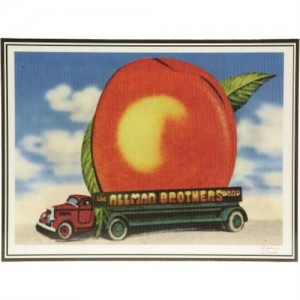Dead rock stars occupy a strange place in the pantheon of Humanity’s heroes. You’ve got brave, doomed soldiers and noble, self-sacrificing leaders and visionary, steadfast iconoclasts and idealistic, graceful martyrs. And then 1938 rolls around, Robert Johnson is poisoned, and shortly thereafter you’ve got dudes who choke on their own vomit in the backseats of cars floating up to Heaven to chill with Hercules and Abe Lincoln and St. Thomas Aquinas. Rock star deaths tend to be violent or self-indulgent, which upon reflection seems to make them the perfect heroes of the Western World’s 20th Century.
Plane crashes, car wrecks, and suicide aren’t the prerogatives of PitchKnives. And though we do cover booze, instances of rock stars drinking themselves to death are pretty pedestrian. There are, however, instances of food becoming entangled with the myths of pop’s premature deaths, one of which I’ll note now, the first in a short series.
Duane Allman was, I was shocked to discover when researching this piece, only 24 when he died. Jesus Christ! The mutton chops on the man made him look 40. And mutton is certainly a food.
Word growing up was that Duane died when a peach truck hit the motorcycle he was riding. The rest of the band, in honor of him, named the subsequently released album Eat a Peach. It’s a pretty awesome tale—injecting a bit of humor and regionalism into a gruesome killing. It’s not a true tale, however.
Turns our Duane clipped the back of a flatbed truck carrying a lumber crane. He was thrown from his Harley, and when he hit the highway the bike, which had bounced up in the air, came down on top of him. The bike then slid 90 feet with Duane pinned beneath. Insanely, the guy was still alive when the ambulance got there, though his internal organs were essentially crushed. He made it all the way to the hospital and emergency surgery, but died on the operating table.
So trees, not peaches, were implicated in the man’s death, but Mill a Tree does not have the jolly sunninesss of Eat a Peach. The working title of the Allman Brothers album currently in production was The Kind We Grow in Dixie, but its cover already featured a truck carrying a giant peach. Just before he was killed, Duane had responded to a reporter’s question about what he was doing to “help the revolution” by saying “There ain’t no revolution, it’s evolution; but every time I’m in Georgia I eat a peach for peace.
The band took the quote and ran with it.
Incidentally, and creepily, the band’s bassist, Berry Oakely, died 13 months later three blocks from the scene of Duane’s death when he clipped a bus on his Triumph motorcycle, was thrown from the bike and slid fifty-eight feet before the Triumph, thrown in the air as well, came down on top of him. If his recent public comments had included any reference to food, history has not recorded it.

